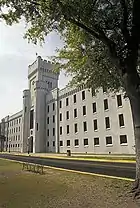Campus of The Citadel
The Campus of The Citadel consists of a 300-acre (120 ha) space adjacent to Hampton Park in Charleston, South Carolina. It has been home to The Citadel since 1922 when the school moved from its location on Marion Square, including the Old Citadel. Arranged with the primary buildings surrounding a central 10-acre (4 ha) parade ground, it consists of barracks for the Corps of Cadets, academic buildings, a mess hall, chapel, library, athletic and recreational facilities, support buildings, and housing for faculty and staff.
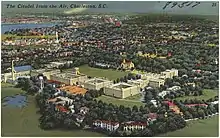
The campus is built in a Spanish Moorish style.
The campus is bounded on the west by the Ashley River, to the north by the Wagener Terrace neighborhood, to the east by Hampton Park and the Hampton Park Terrace neighborhood, and to the South by the Westside Neighborhood.
Just off the main campus are the football stadium, baseball stadium, and alumni center. Additionally, the school owns and operates a large house facility located near the north end of the Isle of Palms.[1]
Academic buildings
| Building | Image | Constructed | Notes | Reference |
|---|---|---|---|---|
| Capers Hall |  | 1942 | Home to the School of Humanities and Social Sciences and Zucker Family School of Education. Will be demolished and replaced beginning in 2021. | [2][3] |
| Bastin Hall | 2020 | Home of Baker School of Business. | [3] | |
| Bond Hall | 1922, 1939 | Former home of Baker School of Business, future home of Zucker Family School of Education. Also houses the President and senior administrative staff, the registrar, and other academic staff. | ||
| Byrd Hall | 1968 | Home of the Department of Chemistry. | ||
| Daniel Library | 1960 | |||
| Duckett Hall | Home of the Department of Biology. | |||
| Grimsley Hall | 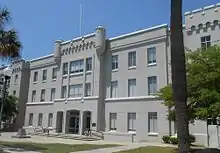 | 1991 | Home of the Swain Family School of Science and Mathematics and the Physics Department. | |
| Jenkins Hall | Houses ROTC Departments, Commandant's Department, armory | |||
| LeTellier Hall | 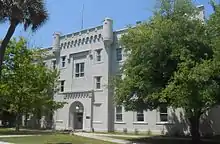 | 1937 | Home of the School of Engineering and the Departments of Civil and Mechanical Engineering. Named for Louis LeTellier | |
| Thompson Hall | 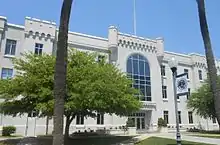 | 1938 (rebuilt in 2001) | Home of the Department of Mathematics and Computer Science. |
Athletic and recreational buildings
| Building | Image | Constructed | Notes | Reference |
|---|---|---|---|---|
| College Park | 1939 | Former home to the baseball team, currently used as a practice facility. | ||
| Deas Hall | 1976 | Campus recreational facility, also home to the Department of Health and Exercise Science. | ||
| Earle Tennis Center | 1990 | |||
| Inouye Marksmanship Center | 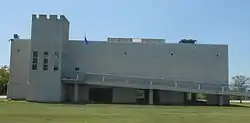 | 2006 | Rifle range. | |
| Johnson Hagood Stadium | 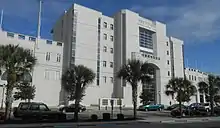 | 1948 | Home of the football team. Seats 13,500. | |
| Joseph P. Riley Jr. Park | 1996 | Home of The Citadel Bulldogs baseball team. Seats 6,000. | ||
| McAlister Field House |  | 1939 | Home of the basketball, volleyball and wrestling teams. Seats 6,000. | |
| Seignious Hall | 1982 | Meeting rooms and locker rooms for the football team, weight room and sports medicine for all varsity teams. | ||
| Swain Boating Center | 2021 | |||
| Vandiver Hall | 1991 | Meeting rooms and locker rooms for all teams other than football. |
Administrative buildings
| Building | Image | Constructed | Notes | Reference |
|---|---|---|---|---|
| Coward Hall | 1991 | Mess Hall | ||
| Mary Bennett Murray Memorial Infirmary | 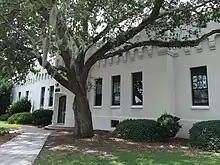 |
Barracks
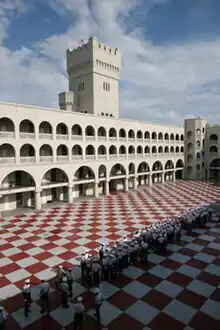
Each of The Citadel's five barracks is built around a central quadrangle of red and white checkerboard style squares. Rooms are arranged along the outer walls with a covered walkway known as the gallery separating rooms from the quadrangle. Of the original four barracks built between 1922 and 1942, only Stevens Barracks has not been demolished and completely rebuilt though it has seen significant renovation. Watts Barracks was constructed in 1996 on the site of the old mess hall. Watts Barracks housed First Battalion while Murray Barracks was under construction before Fourth Battalion occupied Watts Barracks. During the demolition and reconstruction of Padgett-Thomas Barracks from 2000 through 2004, The Regimental Band and Pipes was housed in a temporary structure built behind Stevens Barracks and across Lee Avenue from Watts Barracks. Second and Third Battalions occupied Stevens Barracks during the demolition and reconstruction of Padgett-Thomas Barracks and Law Barracks, respectively.[4]
| Building | Image | Constructed | Notes | Reference |
|---|---|---|---|---|
| Law Barracks | 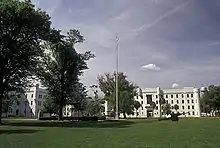 | 1939 (rebuilt 2007) | Houses Third Battalion, composed of I, K, L and M companies. Named for Major General Evander M. Law. | [5] |
| Murray Barracks | 1926 (rebuilt 1999) | Houses First Battalion, composed of A, B, C, and D companies. | ||
| Padgett-Thomas Barracks | 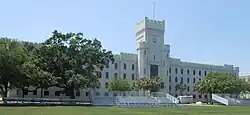 | 1922 (rebuilt 2004) | Houses Regimental Staff and Second Battalion, composed of E, F, G, and H companies, and The Regimental Band and Pipes. | [6] |
| Stevens Barracks | 1942 | Houses Fifth Battalion, composed of Palmetto Battery, P, S, and V companies. | ||
| Watts Barracks | 1996 | Houses Fourth Battalion, composed of N, O, R, and T companies. Named for former Citadel President Lieutenant General Claudius E. Watts III. |
Other buildings
| Building | Image | Constructed | Notes | Reference |
|---|---|---|---|---|
| Boat House | 1920 | To be demolished and rebuilt, estimated completion 2020.[7] | ||
| Career Services | 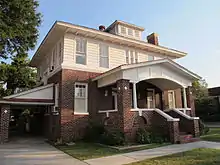 | 1919 | ||
| Faculty House | 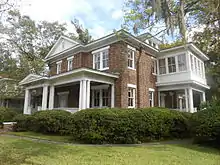 | 1923 | ||
| Holladay Alumni Center |  | 2000 | ||
| Mark Clark Hall | 1957 | Student union, housing gift shop, canteen, Honor Court, Post Office, barber shop, meeting rooms, and an auditorium. | ||
| Quarters One |  | 1954 | Home to the President of The Citadel | |
| Robert R. McCormick Beach Club | 1958 (rebuilt 1995) | Used for weddings and corporate events. Original structure destroyed by Hurricane Hugo in 1989, rebuilt 1995. Severely damaged in a fire on May 8, 2016. | [8][9] | |
| Summerall Chapel |  | 1936 | [10] |
Monuments and memorials
| Building | Image | Constructed | Notes | Reference |
|---|---|---|---|---|
| Howie Bell Tower | 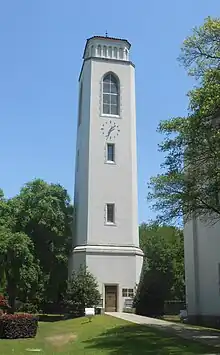 | 1954 | Bell tower and Carillon adjacent to Summerall Chapel in honor of Major Thomas D. Howie, the "Major of St. Lo" who was killed leading his battalion in the liberation of St. Lo, France during the Normandy Campaign in 1944. | |
| HMS Seraph Monument | 1963 | A monument to HMS Seraph which carried future school President General Mark W. Clark to a secret rendezvous with Vichy French forces in North Africa in 1943. Only shore location in the United States authorized to fly the Royal Navy White Ensign. |
References
- "Campus Map and Virtual Tour". The Citadel. Retrieved May 8, 2016.
- Summer Huechtker (January 7, 2021). "Capers Hall to be demolished this year". Charleston, SC: Live 5 News. Retrieved January 31, 2021.
- Amanda Kerr (April 5, 2015). "The Citadel poised to begin two multi-million dollar building projects". Post and Courier. Charleston, SC. Retrieved May 8, 2016.
- "Citadel plans to replace barracks". The Item. Sumter, SC. February 18, 1992. p. 7B. Retrieved May 25, 2016.
- Giles Lambertson (May 10, 2005). "B&B Demolition Infiltrates The Citadel's Law Barracks". Construction Equipment Guide. Retrieved May 25, 2016.
- "Citadel cadets to move into new Padgett-Thomas Barracks on Aug. 2". Columbia, SC: WIS. July 19, 2004. Retrieved May 25, 2016.
- Thad Moore (July 4, 2016). "Citadel hopes to revitalize 'culture of water' with new boathouse project". Post and Courier. Retrieved July 4, 2016.
- "The Citadel Beach Club: History". The Citadel. Retrieved May 8, 2016.
- Erin Gillespie (May 8, 2016). "Early morning blaze damages Citadel Beach Club, closes event venue indefinitely". Post and Courier. Charleston, SC. Retrieved May 8, 2016.
- "About Summerall Chapel". The Citadel. Retrieved May 8, 2016.
